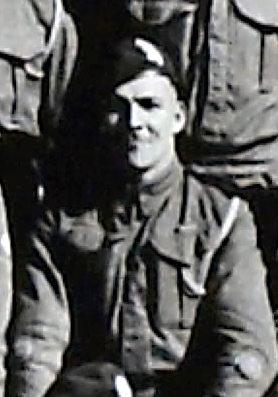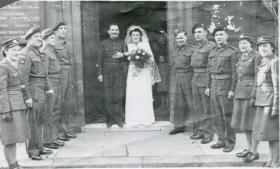Gerald Alexander Strachan was born in 1906 and enlisted into the Black Watch in the 1920’s. He volunteered for Airborne Forces, from the 2nd Battalion, The Black Watch, in 1941, and after the forming up and selection process at Hardwick Hall, he attended Parachute Course No 1, at RAF Ringway, 3 to 15 November 1941 and then the 2nd Advanced Parachute Course, 14 – 19 January 1942. Unfortunately he was injured on this course, in the preliminary training, and did not carry out any jumps. At this time he was one of the Sergeants in C-Company.
He was made the Company Sergeant Major of C-Company, 2nd Parachute Battalion, replacing CSM Gilroy. Soon after taking up his post he was asked by Major Johnny Frost to organise the arms and ammunition for an important series of demonstrations. Dealing with the arms and blank ammunition for the exercise meant that he had to ask more questions than was easily answered by Major Frost, as this was actually the cover story for the rehearsals for the Bruneval raid!
In his book ‘A DROP TOO MANY’, Major-General John Frost had this to say about him;
‘We were very fortunate in having an experienced old soldier as Company Sergeant Major. This was Strachan of the Black Watch, a man who knew just exactly how a Company should be run, and one could be sure that when the Company was required to be at a certain place at a certain time, be there it would.’
For the Raid on Bruneval he was awarded a CERTIFICATE FOR GOOD CONDUCT in the King’s Birthday Honours, June 1942. The French awarded him the CROIX DE GUERRE with GILT STAR, the citation for which reads,
During the parachute raid on the RDF installation at Bruneval on the night of 27-28 February 1942 this Warrant Officer displayed courage, efficiency and devotion to duty of a high order. As Company Sergeant Major he was accompanying Company HQ and the reserve on the withdrawal to the beaches. The party came under heavy fire from the defences on the far side of the beach and CSM Strachan was severely wounded through the stomach. In spite of this, this Warrant Officer continued to assist his Company Commander in clearing the enemy from the beaches and in organising the embarkation. Both before and during the operation this Warrant Officer displayed outstanding qualities of leadership and courage. His courage after he was seriously wounded was beyond all praise.
It took Gerry Strachan a long time to recover from his wounds, but when he had he immediately carried out some parachute descents. He served for a time at the Airborne Forces Depot and Training School, at Hardwick Hall, and many a potential parachutist remembers him. He rejoined the 2nd Parachute Battalion in North Africa in August 1943 and was made the Regimental Sergeant Major. [1] This meant that although he had missed the parachute operation in Sicily, he took part in Operation ‘Slapstick’, the landings at Taranto, Italy in September 1943.
On return to the United Kingdom the battalion was billeted in the Lincolnshire area to the north of Grantham, astride the A1. He ruled his ‘domain’, Stoke Rochford Hall, the Headquarters for the battalion with a firm hand.
On Sunday the 17 September 1944 he parachuted onto drop zone ‘X’ along with the rest of the 2nd Parachute Battalion and the 1st Parachute Brigade. He fought at Arnhem Bridge for four days, being wounded again and then taken prisoner on the Thursday, 21st September.
He was sent to Stalag 11B at Fallingbostel, and was admitted to the Hospital Block on the 4 January 1945. Later on he must have been moved to one of the camps in the East of Germany as he turned up in Odessa on the 25 March 1945, along with hundreds of other POW’s who had made their way East, after their camps were over-run by Russian Forces. He sailed on a ship, bound for England on the 27/28 March, and arrived in Liverpool on the 17 April 1945. [2]
Upon his return to the UK he was stationed in Harrogate, and served under the command of Lieut-Colonel RG Parker. [3]
He was discharged from the Army Air Corps and returned to his old Regiment, The Black Watch, on the 25 May 1946.
Gerald Alexander Strachan died in July 1948.
Report in the Sheffield Star July 1948.
RSM DIED OF RAID WOUNDS.
Stomach wounds received by a Regimental Sergeant Major during a raid on Bruneval in 1942 led to his death, it was stated at a Sheffield inquest today.
The inquest was on Gerald Alexander Strachan, aged 42, of Studley Road, Darnall, Regimental Sergeant Major in The Black Watch, who died following an operation. The coroner, Mr A.P. Lockwood, recorded a verdict of ‘Death by Misadventure’.
Mrs Ivy Strachan said her husband had served over 20 years with the Army and had been on airborne operations during the war.
While on leave last Saturday, she said, he complained of stomach pains and was admitted to hospital. He was wounded in the stomach during the Bruneval raid and had said he was wounded during the Arnhem operation two years later, when he was also taken prisoner.
Dr R.H. Canter said that under an operation an obstruction was dealt with successfully, but later a further obstruction developed. The cause of death, he said, was due to paralysis of the ileus. ‘On the assumption that Mrs Strachan’s evidence of her husband having been wounded during a war operation in 1942 is correct. I am satisfied her husband died as a later sequel to the injuries’, said the coroner.
The Dundee Courier and Advertiser. Monday, 2 August 1948.
SUDDEN DEATH OF BLACK WATCH RSM.
News of the death of RSM Gerald Alexander Strachan was a shock to soldiers of the Black Watch at Queen’s Barracks Perth.
He brought the 2nd Battalion home from Pakistan in March this year and was on leave in Sheffield when he entered Hospital for an operation. He was 41 and leaves a wife and two young children.
An Aberdonian, he joined the Black Watch 20 years ago. He coached the boxing team for many years.
Early in the last war he volunteered as a parachutists and took part in raids on the French coast before D-Day. He was mentioned in despatches.
For his part in the Arnhem fighting, where he was taken prisoner, he received the Croix de Guerre. [Not correct, see rest of account!]
In the October 1948 edition of the Pegasus journal Major JD Frost, DSO, MC, wrote:
“Many old members of Airborne Forces will have learnt with deep regret of the sudden death of RSM AG Strachan, The Black Watch, in July. RSM Strachan joined the Parachute Regiment as a Sergeant in September, 1941, at Hardwick when the 1st Parachute Brigade was being formed. He was soon promoted CSM of “C” Company of the 2nd Parachute Battalion. He was very seriously wounded during the Bruneval raid in February, 1942, being hit in the stomach by a burst of machine-gun fire. He made an amazing recovery and was back on duty in two months. He was awarded the Croix de Guerre for his part in the raid. After being at Airborne Forces Depot at Hardwick for nearly one year he re-joined the 2nd Battalion in Tunisia as RSM and served with them in Italy, the UK and at Arnhem where he was wounded before being taken prisoner. In 1945 he was RSM of the Parachute Regiment Holding Battalion; in 1946 he returned to his own regiment as RSM of the 2nd Battalion, The Black Watch. This was the last regiment to leave Pakistan and many of his old friends were glad to see pictures in the press of him standing on the quay at Karachi, swathed in garlands and obviously, as usual, having the situation well in hand. He died very suddenly as a result of the wounds he received six years before. The doctors say it is incredible that he was able to serve the regiments he loved for so long. All he could wish is to be remembered as a very fine old soldier indeed.
Our deepest sympathy goes to his wife, his little son and daughter.”
NOTES:
[1] In his book ‘A Drop Too Many’, John Frost says that Strachan joined them after Sicily, whilst at Sousse.
[2] From the personal diary of Sgt. JF Collett. 9 Platoon, ‘T’ Company, 1st Parachute Battalion.
[3] The Yorkshire Post and Leeds Mercury. Tuesday, 23 October 1945.
Information by R Hilton, D Locke and J Howes of The Arnhem Fellowship.
Read More



Latest Comments
There are currently no comments for this content.
Add Comment
In order to add comments you must be registered with ParaData.
If you are currently a ParaData member please login.
If you are not currently a ParaData member but wish to get involved please register.